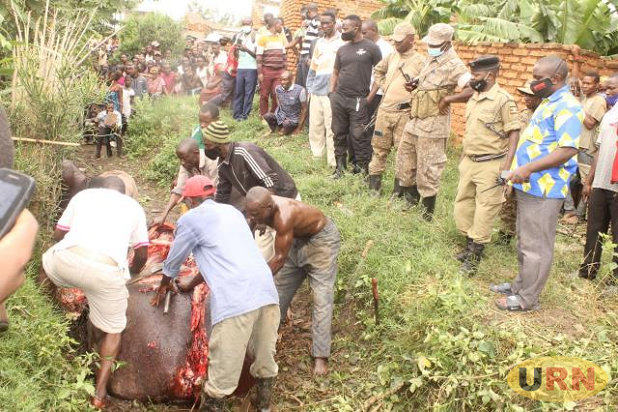Kasese District, Uganda – Two residents of Buhweju Parish, Bwehweju Sub-county, are fighting for their lives after being savagely attacked by a hippopotamus earlier this week, reigniting fears over the escalating human–wildlife conflict in communities bordering Queen Elizabeth National Park.
The victims have been identified as John Owe (56) and Junior Bwambale (17).
According to Owe, the hippo ambushed him on Tuesday around 1 p.m. as he returned home from his garden.
“The hippo just found me on the way and attacked me. I tried to escape, but it overpowered me,” he recounted from his hospital bed at Canopus Healthcare and Pharmaceuticals Uganda Limited.
Owe, who is the breadwinner of his household, expressed deep worry about his family’s survival if he fails to fully recover.
Meanwhile, Bwambale suffered even more severe injuries. His mother, Lucia Kapamba, described the teenager’s condition as critical after he was gored in the stomach, exposing internal organs. He is currently admitted at Mt. St. Mary’s Hospital.
“My child is in a very bad state. I want the Uganda Wildlife Authority to take full responsibility and pay all his medical bills, no matter how long the treatment takes,” she demanded.
UWA Responds, Hippo Put Down
Rangers from the Uganda Wildlife Authority (UWA) quickly tracked down and neutralized the animal. Its carcass was later removed from the community.
UWA spokesperson Bashir Hanji confirmed the incident and extended sympathy to the victims’ families.
“We shall take care of the hospital bills, and as per our policy, the victims are entitled to compensation,” he said.
Hanji acknowledged the growing scale of human–wildlife conflict in areas bordering national parks despite interventions such as electric fencing.
A Recurring Threat
Kasese District, which borders Queen Elizabeth National Park, has long grappled with wildlife incursions—particularly from hippos, elephants, and buffaloes that wander into villages, destroying crops, injuring residents, and at times claiming lives.
Hippos remain among the most feared animals in the region due to their territorial aggression, with experts noting that they kill more people in Africa annually than lions or crocodiles.
While UWA has rolled out fencing projects, community sensitization, and compensation schemes, residents insist more proactive measures are needed to safeguard lives.
“We need real protection, not just promises after someone gets hurt,” one villager told reporters.
As Owe and Bwambale continue their battle for survival in hospital, their ordeal has once again spotlighted the urgent need for stronger measures to protect communities living on the frontline of Uganda’s human–wildlife conflict.
